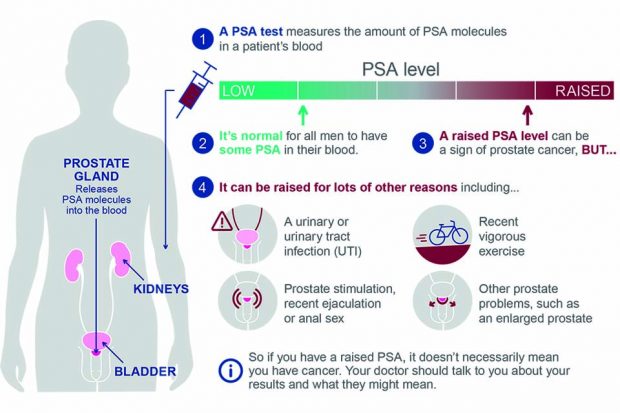
We have published updated guidance for GPs and well men aged 50 and over about prostate specific antigen (PSA) testing for prostate cancer.
The prostate cancer risk management programme (PCRMP) information, first published on GOV.UK 4 years ago, reflects the latest evidence on the benefits and risks of having a PSA test. The test measures the level of PSA in blood and is the most common initial test carried out for men worried about prostate cancer.
A raised PSA level can mean a man has prostate cancer, but in some cases it may miss a cancer risk. It can also falsely identify a possible risk, or find a slow growing cancer that may never cause symptoms or shorten life. For these reasons, the UK NSC’s recommendation is not to support the PSA test as the basis for a screening programme.
PHE has worked with Prostate Cancer UK, Cancer Research UK, GPs and other clinicians to update the PCRMP’s 2 summary publications on GOV.UK in line with updated guidance from the National Institute for Health and Care Excellence.
The updated publications include the recommendation that all men suspected of having prostate cancer that has not spread outside the prostate gland should be offered a specialist MRI scan, called multiparametric MRI (mpMRI). The benefit of having mpMRI is that fewer men may need to go on to have a prostate biopsy if their risk of having a prostate cancer that could cause them harm is low.
The updated information for well men also includes a new infographic that helps explain the complexities of PSA testing.
How GPs should use the PCRMP
The PCRMP provides clear and balanced information to help GPs and other primary care professionals advise well men aged 50 and over who ask about the PSA test.
GPs should only use the PCRMP to counsel asymptomatic men aged 50 and over who proactively ask about testing. It does not apply to their consultations with men at high risk or men with symptoms of any age.
GPs should download and print out copies of the patient information summary sheet as and when required.
Prof Anne Mackie, PHE’s Director of Screening, said:
The decision about whether a man takes a PSA test is a complex one and has to be thought through carefully.
There are potential harms as well as benefits in taking the test and we know that many men really appreciate the opportunity to discuss the test with their GP.
The updated information pack will make it easier for GPs to have this conversation with their patients, and assist men in making a decision that is right for them.
PHE Screening blog
The PHE Screening blog provides up to date news from all NHS screening programmes. You can register to receive updates direct to your inbox, so there’s no need to keep checking for new blogs. If you have any questions about this blog article, or about population screening in England, please contact the PHE screening helpdesk.